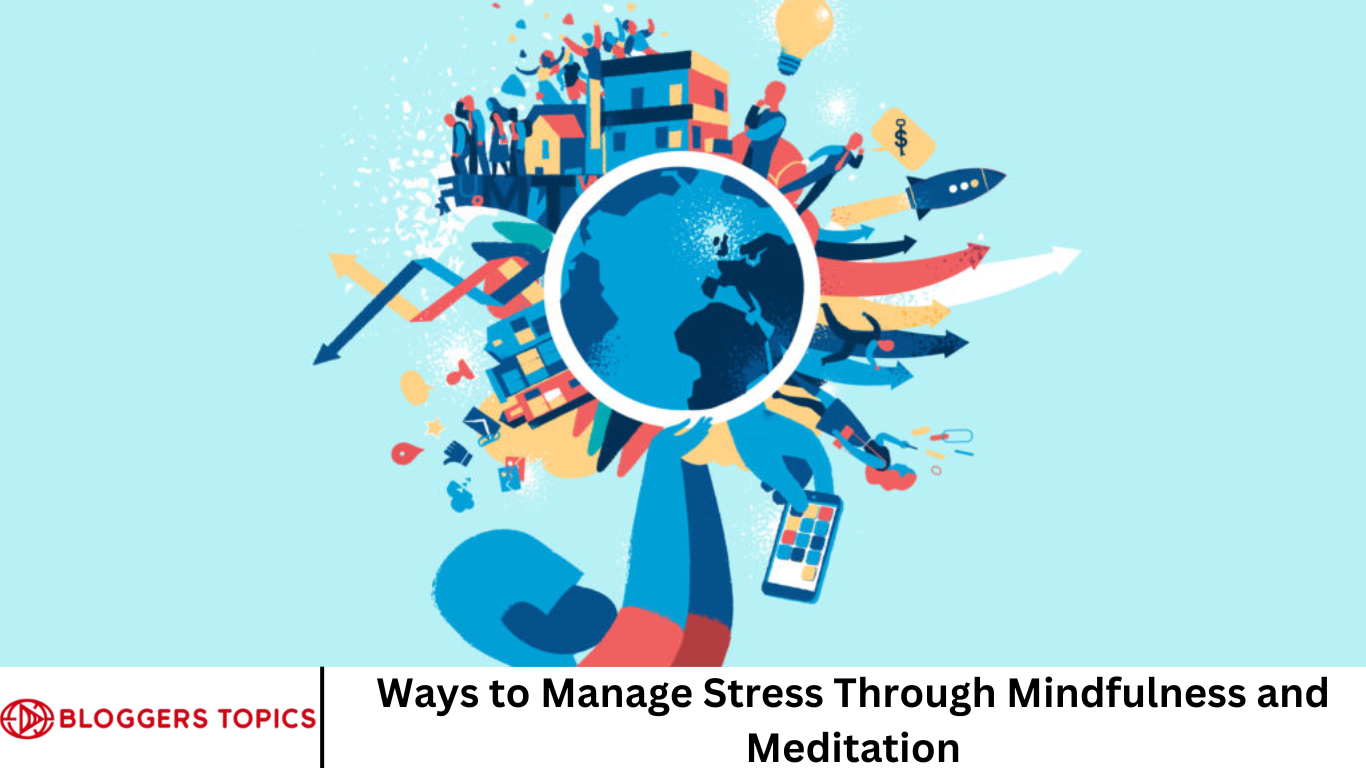Stress is a natural response to life’s demands, challenges, and changes. From tight deadlines and work pressure to personal struggles and life transitions, stress can take a toll on both your mind and body. According to the National Institute of Mental Health, stress triggers a chemical response in the body, commonly known as the “fight-or-flight” reaction, which helps us cope with immediate threats.
While stress can be helpful in short bursts, chronic stress can have adverse effects, leading to various mental and physical health issues. Therefore, learning to manage stress is crucial to maintaining overall well-being. One of the most effective ways to manage stress is through mindfulness and meditation.
These practices have been shown to help reduce stress, improve mental clarity, and promote emotional health. In this article, we will explore how mindfulness and meditation can help manage stress and provide practical tips for incorporating them into your daily life.
More Read: Top 10 Air-Purifying Houseplants You Need to Try
What is Mindfulness?
Mindfulness is the practice of paying attention to the present moment in a non-judgmental way. It involves being fully aware of your thoughts, emotions, physical sensations, and surroundings without becoming overwhelmed by them. Mindfulness allows you to observe your experiences with an open, accepting attitude, rather than reacting impulsively or getting lost in negative thoughts.
Mindfulness can be practiced in many ways, including through meditation, breathing exercises, body scans, and simple awareness during everyday activities. By focusing on the present moment, mindfulness helps you break the cycle of worry, rumination, and stress that often occurs when we focus on past regrets or future anxieties.
The Science Behind Mindfulness and Stress Reduction
Research has shown that mindfulness can be an effective tool in reducing stress. Studies indicate that practicing mindfulness activates the parasympathetic nervous system, also known as the “rest and digest” system, which helps counteract the stress response and promotes relaxation. Additionally, mindfulness has been found to reduce activity in the amygdala, the brain’s center for processing fear and anxiety.
Mindfulness can also improve emotional regulation by helping individuals become more aware of their emotional triggers and responses. This awareness allows people to respond to stress in a more balanced way, rather than reacting impulsively or becoming overwhelmed by negative emotions.
How Mindfulness Helps with Stress Management
- Improved Emotional Awareness: Mindfulness helps individuals become more aware of their emotional states and reactions. This awareness allows people to manage their emotions more effectively, reducing the likelihood of stress becoming overwhelming.
- Reduced Negative Thinking: By focusing on the present moment, mindfulness helps break the cycle of negative thinking that often contributes to stress. Instead of worrying about the past or future, individuals can focus on what is happening in the here and now, promoting a sense of calm and clarity.
- Increased Resilience: Mindfulness helps individuals develop greater emotional resilience by teaching them to approach stress with a sense of acceptance and compassion. Instead of fighting against stress or trying to avoid it, mindfulness encourages individuals to embrace challenges and respond to them in a constructive way.
- Improved Focus and Concentration: Regular mindfulness practice has been shown to enhance cognitive functions such as attention, memory, and decision-making. This increased focus and concentration can help reduce stress by improving productivity and reducing feelings of overwhelm.
What is Meditation?
Meditation is a practice that involves focusing the mind to achieve a mentally clear and emotionally calm state. It has been used for thousands of years to promote relaxation, self-awareness, and mental clarity. There are many different types of meditation, but all share the common goal of fostering a deep state of relaxation and awareness.
Meditation can take many forms, including guided meditation, breath awareness, body scan meditation, and loving-kindness meditation. Each type of meditation offers unique benefits, but all aim to reduce stress, increase mindfulness, and promote overall well-being.
The Science Behind Meditation and Stress Reduction
Like mindfulness, meditation has been extensively studied for its ability to reduce stress. Research shows that meditation activates the relaxation response, which counteracts the body’s natural stress response. This helps lower blood pressure, reduce heart rate, and promote a sense of calm and relaxation.
Meditation also has a positive impact on the brain. Studies have shown that regular meditation practice can increase gray matter in the brain, particularly in areas associated with emotional regulation, memory, and self-awareness. This structural change in the brain may help individuals better manage stress and emotional challenges.
How Meditation Helps with Stress Management
- Promotes Deep Relaxation: Meditation helps activate the body’s relaxation response, which counters the stress response. This promotes a deep state of relaxation, lowering blood pressure, heart rate, and cortisol levels, which are commonly associated with stress.
- Increases Emotional Regulation: Meditation helps individuals develop greater emotional control by promoting mindfulness and awareness of their thoughts and feelings. This allows people to respond to stress with greater calm and clarity, rather than reacting impulsively.
- Reduces Rumination: One of the main causes of stress is rumination, or the tendency to dwell on negative thoughts and experiences. Meditation helps individuals let go of these negative thought patterns by focusing the mind on the present moment, reducing the impact of past regrets and future anxieties.
- Enhances Self-Compassion: Meditation practices such as loving-kindness meditation encourage individuals to cultivate self-compassion and acceptance. This can help reduce feelings of stress by promoting a kinder and more accepting attitude toward oneself, especially during difficult times.
Practical Tips for Incorporating Mindfulness and Meditation into Your Daily Life
Incorporating mindfulness and meditation into your daily routine doesn’t have to be time-consuming or complicated. Here are some practical tips to help you get started:
1. Start with Short Sessions
If you’re new to mindfulness and meditation, start with just 5 to 10 minutes a day. Over time, you can gradually increase the length of your sessions as you become more comfortable with the practice.
2. Focus on Your Breath
A simple way to practice mindfulness and meditation is to focus on your breath. Sit in a comfortable position, close your eyes, and take slow, deep breaths. Pay attention to the sensation of the air entering and leaving your body. If your mind starts to wander, gently bring your focus back to your breath.
3. Practice Mindfulness Throughout the Day
You don’t need to set aside a specific time for mindfulness practice. You can practice mindfulness throughout the day by focusing on the present moment during everyday activities, such as eating, walking, or washing dishes. Pay attention to the sights, sounds, and sensations around you, and try to stay fully present in the moment.
4. Use Guided Meditation Apps
If you prefer structure, there are many guided meditation apps available that can help you get started. Apps like Headspace, Calm, and Insight Timer offer a variety of meditation sessions that guide you through the process, making it easier to stay focused and relaxed.
5. Practice Self-Compassion
Be kind to yourself as you begin your mindfulness and meditation journey. It’s normal for your mind to wander during meditation, and you may encounter challenges along the way. Instead of judging yourself, practice self-compassion and gently return your focus to the present moment.
6. Create a Consistent Routine
To experience the full benefits of mindfulness and meditation, it’s important to practice regularly. Try to set aside a specific time each day for your practice, whether it’s in the morning, during lunch, or before bed. Consistency will help you build a habit and improve the effectiveness of the practice over time.
Frequently Asked Question
How does mindfulness help reduce stress?
Mindfulness helps reduce stress by encouraging individuals to focus on the present moment without judgment. By becoming more aware of thoughts, emotions, and physical sensations, you can prevent stress from escalating. Mindfulness also helps break the cycle of rumination, where negative thinking patterns amplify stress, and fosters emotional regulation, allowing you to respond to stress in a more balanced and calm way.
What are the benefits of meditation for stress management?
Meditation helps activate the body’s relaxation response, counteracting the stress-induced fight-or-flight reaction. Regular meditation practice reduces levels of stress hormones like cortisol, lowers heart rate and blood pressure, and promotes a sense of inner calm. Additionally, meditation improves emotional awareness and helps break the cycle of negative thinking, which is often linked to increased stress.
How much time do I need to practice mindfulness or meditation to see results?
You can experience benefits from just 5 to 10 minutes of mindfulness or meditation daily. While some people may feel immediate calm and clarity, the more consistent you are, the more long-lasting benefits you’ll see. Over time, you may gradually increase your practice duration as it becomes easier and more natural.
Can mindfulness and meditation help with chronic stress or anxiety?
Yes, mindfulness and meditation can be effective in managing chronic stress and anxiety. These practices help train the mind to stay present and avoid the constant worrying or overthinking that fuels anxiety. Mindfulness helps you become more aware of stress triggers, allowing you to address them with a sense of calm, while meditation provides tools for relaxation and emotional regulation.
Are there any specific types of meditation for stress relief?
- Yes, some types of meditation are particularly helpful for stress relief, including:
- Breath awareness meditation: Focusing on the breath helps calm the mind and reduce physical tension.
- Body scan meditation: Helps increase awareness of physical sensations and release tension throughout the body.
- Loving-kindness meditation (Metta): Encourages compassion and positive feelings toward yourself and others, reducing stress and promoting emotional well-being.
How can I practice mindfulness throughout the day?
You can practice mindfulness during everyday activities by fully focusing on the task at hand. For example, pay attention to the sensations of eating, the sounds and sights around you while walking, or the feeling of water on your skin when washing dishes. The key is to stay present and avoid distractions, such as overthinking or multitasking, which can lead to stress.
Is it normal to feel restless or distracted during mindfulness or meditation?
Yes, it’s completely normal to feel restless or distracted, especially when you’re just starting out. The mind naturally wanders, but the goal is to gently bring your focus back to your breath or the present moment without judgment. With practice, you’ll become better at managing distractions and increasing your ability to stay present, leading to greater relaxation and stress relief.
Conclusion
Stress is an inevitable part of life, but how we respond to it makes all the difference. Mindfulness and meditation are powerful tools for managing stress, improving emotional regulation, and promoting overall well-being. By practicing mindfulness and meditation regularly, you can reduce the impact of stress, increase resilience, and cultivate a greater sense of calm and clarity in your life. Whether you’re a beginner or an experienced practitioner, there are many ways to incorporate mindfulness and meditation into your daily routine. Start small, be patient with yourself, and remember that the benefits of these practices grow over time.







